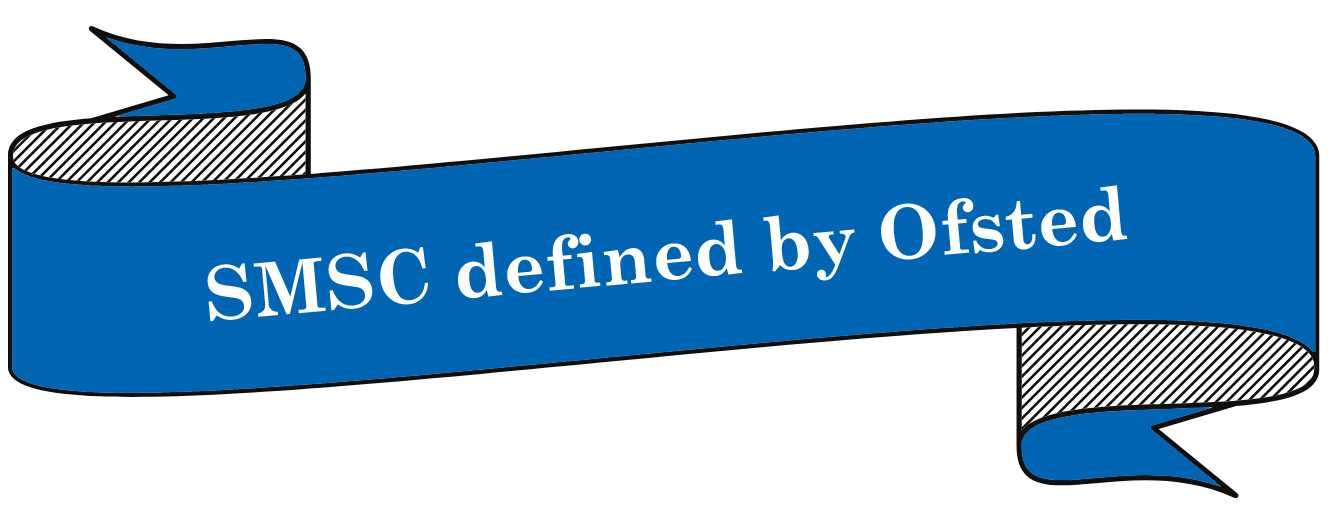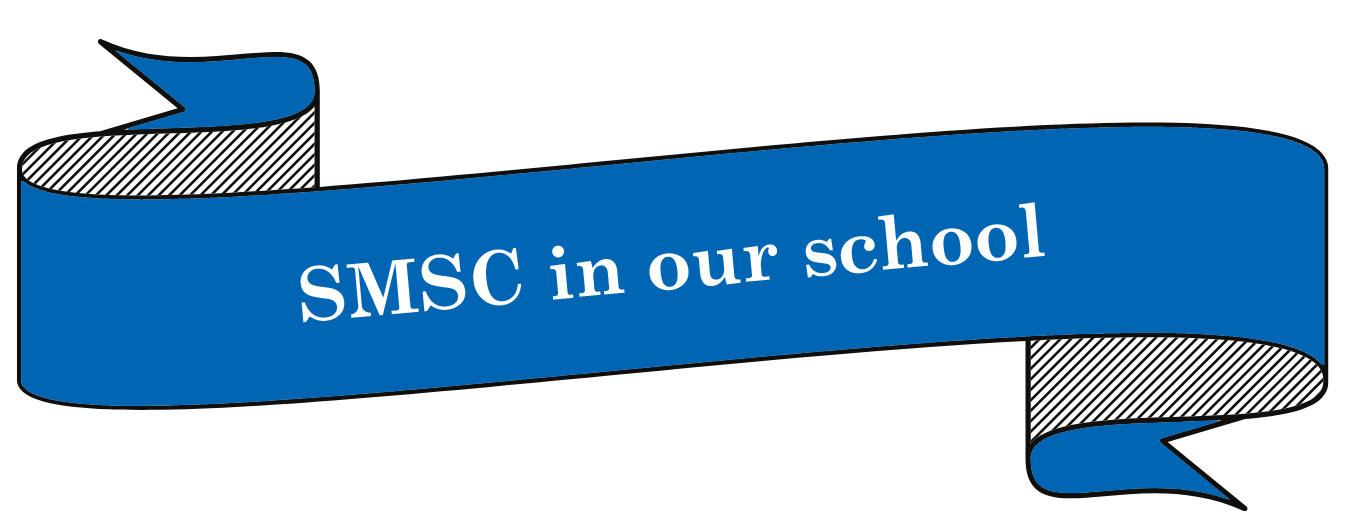SMSC
SMSC lies at the heart of our school. At UVHS, we believe that by developing the spirituality of students, helping them develop a strong sense of what is morally right and wrong, improve their social skills and broaden their cultural awareness, they will leave us as well rounded individuals who are tolerant and accepting of all.
SMSC is broken down into four areas:
- Spirituality
- Morals
- Social
- Cultural

SMSC is defined in the Ofsted School inspection handbook as:
SMSC Area: The spiritual development of pupils is shown by their:
Ofsted Encouraged Values & Skills
- ability to be reflective about their own beliefs (religious or otherwise) and perspective on life
- knowledge of, and respect for, different people’s faiths, feelings and values
- sense of enjoyment and fascination in learning about themselves, others and the world around them
- use of imagination and creativity in their learning
- willingness to reflect on their experiences
SMSC Area: The moral development of pupils is shown by their:
Ofsted Encouraged Values & Skills
- ability to recognise the difference between right and wrong and to readily apply this understanding in their own lives, recognise legal boundaries and, in so doing, respect the civil and criminal law of England
- understanding of the consequences of their behaviour and actions
- interest in investigating and offering reasoned views about moral and ethical issues and ability to understand and appreciate the viewpoints of others on these issues.
SMSC Area: The social development of pupils is shown by their:
Ofsted Encouraged Values & Skills
- use of a range of social skills in different contexts, for example working and socialising with other pupils, including those from different religious, ethnic and socio-economic backgrounds
- willingness to participate in a variety of communities and social settings, including by volunteering, cooperating well with others and being able to resolve conflicts effectively
- acceptance and engagement with the fundamental British values of democracy, the rule of law, individual liberty and mutual respect and tolerance of those with different faiths and beliefs; they develop and demonstrate skills and attitudes that will allow them to participate fully in and contribute positively to life in modern Britain.
SMSC Area: The cultural development of pupils is shown by their:
Ofsted Encouraged Values & Skills
- understanding and appreciation of the wide range of cultural influences that have shaped their own heritage and that of others
- understanding and appreciation of the range of different cultures in the school and further afield as an essential element of their preparation for life in modern Britain
- ability to recognise, and value, the things we share in common across
- cultural, religious, ethnic and socio-economic communities
- knowledge of Britain’s democratic parliamentary system and its central role in shaping our history and values, and in continuing to develop Britain
- willingness to participate in and respond positively to artistic, musical, sporting and cultural opportunities
- interest in exploring, improving understanding of and showing respect for different faiths and cultural diversity and the extent to which they understand, accept and respect diversity. This is shown by their respect and attitudes towards different religious, ethnic and socio-economic groups in the local, national and global communities

Below are examples of where we incorporate the four strands of SMSC across our curriculum; this is not an exhaustive list, but an insight into the personal growth our students are exposed to across all areas of school:
SMSC Area: Spirituality in BPE
- Although we are a non-denominational school, we have an extensive Religious Studies curriculum across all Key Stages
- Students in Year 7 look at the difference between belief and opinion, the shared values that bind Christianity, Judaism and Islam together and how to be effective global citizens.
- In Year 8 and 9, students look at Chinese Philosophy, Buddhism and Hinduism. They learn how to explore different moral dilemmas, how politics and government impact citizenship and spirituality, and examine the arguments in favour of God and
- At KS4, The GCSE syllabus contains opportunities to examine and analyse a range of issues, including views on the role of the family, quality and sanctity of life, the right to die, the ethics of suicide, the ethics of divorce, gender and transgender issues. It also addresses the importance of consent, sexual relationships, the ethics of abortion
- Pupils also consider more global issues, such as the concept of a Just War, the use of chemical/biological weapons, weapons of mass destruction, correct definitions of terrorism, the right to peaceful protest, the purpose of prison, forgiveness, and the arguments for and against capital and corporal punishment.
- All of these issues are examined from a variety of religious and secular perspectives, in order to help pupils make as informed a choice as possible when determining their own views in response to these topics
SMSC Area: Morals in Computing and DT
In Computing:
- Through real life case studies, students consider issues surrounding the misuse and access rights to personal data. The use of case studies in computing encourages students to draw conclusions through evidence rather than their preconceptions whilst allowing the students the time to reflect on the origins of their own personal perceptions of a topic.
- Students consider the effects of social networking and the consequences of cyber bullying; they also consider the legal aspects of ICT including the Data Protection Act, Computer Misuse Act and Copyright legislation.
- They consider the implications of file sharing and downloading illegally and the penalties for engaging in this type of activity.
- Students also consider the moral aspects of developments in technology including the use of CCTV cameras, Speed Cameras and Loyalty Cards to balance up people’s rights and responsibilities.
In DT:
- Students look at the use of smart materials to save lives and improve the quality of living
- We explore ways to minimise food waste and learn about Fairtrade systems
- We offer a varied range of extra-curricular activities across all material discipline areas and go on trips and competition days through STEM and the Rotary Club
- We look as sustainability of woods, FSC approved timber and the 6 R’s
- We are reflective on our work practically, and continually look to refine our skills, practice techniques and support others
SMSC Area: Social in Art, Science, History and Maths
In Art:
- We explore link with historical events such as the Pablo Picasso painting of Guernica
- We look at Pop Art as a post war context and it links with consumerism and celebrity culture
In Science:
- We discuss cloning, genetic engineering, IVF and fertility treatment
- Students discuss the impact of using legal and illegal drugs and non-communicable diseases
- We explore the use of animals for testing
- We discuss the wider impact of ecology, climate change and Darwin’s theory of evolution by natural selection
In History:
- We look at social reformers, the British Empire, Industrial towns and population growth
- We learn about Parliament, the Monarchy, Civil War, Puritans, Protestants and Catholics
- Year 7 discuss Worldwide Ancient Civilisations, religious tolerance, the Magna Carter, women in history and Black Tudors
- Throughout KS3 and 4 we explore the Great Depression, dictatorship, WWII, the treatment of Jews, Nazism, artefacts and Tutankhamun, the history of pandemics and vaccinations, the NHS and development of public health, the Cold War and religious diversity
In Maths:
- Social development pervades every Mathematics lesson with many opportunities for students to work in groups. All learners feel that their opinion is worthwhile.
- Maths isn’t confined to the timetable, and we look at “Where Maths will take you?” for careers, we give students opportunities to take part in Chess Club, Pi-Day, UKMT Challenges, Faraday STEM Challenge, the BAE STEM Roadshow, MEM Open Challenge and apply to be a Maths Buddy to help a lower school student improv their own Mathematical ability.
SMSC Area: Cultural in Modern Foreign Languages
In Modern Foreign Languages:
- By its very nature, the study of MFL shows an appreciation of cultural diversity and challenges racism.
- In Years 10 and 11, students look at the differences between the English school system and the French, German and Spanish school systems. They are given the opportunity to discuss the pros and cons of wearing a school uniform as part of this unit as French and German students do not wear uniform.
- We are developing a pen pal link with Ulverston’s twin town Albert.
- At KS3, students create restaurant/café menus and discover/discuss typical French, German and Spanish dishes.
- We aim to organise annual visits to France, Germany and Spain. These give students first-hand experience of other cultures.
